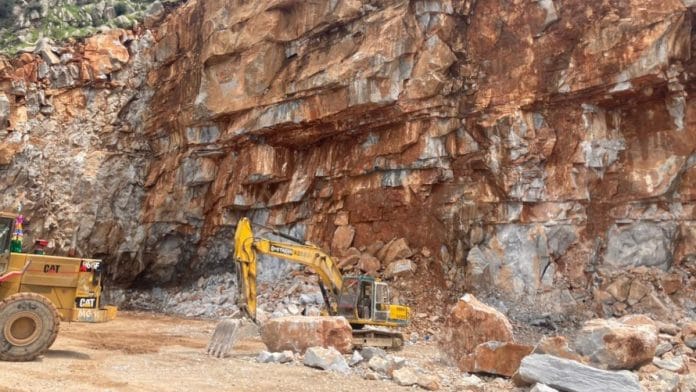New Delhi: A new mining bill has sparked outrage in Pakistan, especially in its restive northwest province of Khyber Pakhtunkhwa. Residents and activists say it only asserts what they have been long echoing: ‘We are a colony of Pakistan’.
The proposed law, Khyber Pakhtunkhwa Mines and Minerals (Amendment) Act, is aimed at modernising the minerals sector in the region but it has rapidly become a flashpoint for legal challenges, internal party rifts in the ruling PTI, and accusations of federal overreach and military profiteering.
“The Khyber Pakhtunkhwa Mines and Minerals Act 2025 is nothing but a renewed colonial onslaught on Pashtun land, resources, and sovereignty,” human rights lawyer Moniza Kakar told ThePrint.
She added that through this bill, federal and corporate actors are being handed unchecked authority to loot ancestral lands, displace indigenous communities, and militarise entire regions under the pretense of investment and national progress.
“This is not harmonisation—this is recolonisation. Our lands and minerals are not for sale,” she added.
The region is mineral-rich, boasting 2.9 billion tons of marble reserves (99 per cent of Pakistan’s total), granite, limestone, gypsum, and coal, along with precious gemstones like emerald and aquamarine, and elements like copper and antimony. In 2020–21, KP’s mineral production peaked at around 40 million tons and it leads national marble production with 2.47 million tons, according to a 2023 research report by Peshawar Chamber of Commerce.
With vast reserves but low returns, the government is aggressively pitching the sector to foreign investors, as seen at the Pakistan Minerals Investment Forum 2025 in Islamabad earlier this month, which hosted delegates from the US, China, and Saudi Arabia.
Now, the bill has been promoted as an update to the province’s 2017 mining law, promising to attract foreign investment, formalise mining operations, and improve regulatory oversight in a sector allegedly plagued by unlicensed extraction and mafias.
But critics say it threatens constitutional autonomy, empowers unelected authorities, and sidelines local communities—especially in the merged tribal districts, home to untapped and contested mineral wealth.
Also read: Pakistan MP warns country could lose Balochistan and Khyber Pakhtunkhwa, slams govt
‘Unconstitutional, exploitative and a tool for politics’
For residents of the tribal belt, the issue isn’t just legal—it’s existential.
“The new KP mining bill grants sweeping powers to a central authority while sidelining local communities, transparency, and environmental safeguards. It allows foreign firms unchecked access with no job quotas, royalty mandates, or tech transfer requirements. Vague terms like “strategic minerals” open doors to federal overreach, weakening the 18th Amendment. In short, KP risks becoming a resource colony—stripped, polluted, and excluded,” Rahim Wazir, a KP resident and PTM’s Punjab head told ThePrint.
The PTM is a grassroots human rights movement advocating for the rights of Pashtuns, primarily based in Pakistan’s Khyber Pakhtunkhwa and Balochistan provinces. It is currently banned in Pakistan.
“We ask the government, who are you giving power to? Because it is certainly not us. We have minerals, gas, and resources. But we have no access to them. All we get is disease and terrorism,” Rahim said.
In a statement issued by PTM head, Manzoor Pashteen, the group calls it a “dangerous escalation in the corporate and colonial plunder” of Pashtun lands.
They argue that under the banner of “Green Pakistan” and via the unchecked authority of the federal and military-run Special Investment Facilitation Council (SIFC), a centralised push for land grabs is underway across Pakistan.
“If SIFC decides tomorrow that copper is a strategic mineral, all the rights we were given under the Constitution vanish. It’s a loophole for total control. We can’t even leave our homes at night. This bill will only worsen the situation. It proves exactly what the PTM has been saying for years—we are a colony of Pakistan,” Wazir noted.
He didn’t spare the KP provincial government either, accusing it of political opportunism. “The only thing the provincial government cares about is freeing Imran Khan. If that means handing over power to the military, they’re ready to do it. PTI has lost everywhere—except KP. It’s no coincidence. They’re helping the army execute its agenda here,” he added.
Also read: Pakistan’s Arshad chaiwalla at risk of deportation. His case will impact Afghans like him
What the bill proposes
At the heart of the amendment are sweeping institutional and regulatory changes such as the creation of a Special Mines Force to arrest, seize equipment, and shut down illegal mining—especially in tribal areas where an estimated 3,500 mines remain dormant or unregulated. It also includes the establishment of a Mines Appeal Court to expedite mining-related disputes along with a new KP Mines and Minerals Regulatory Authority to issue licenses and enforce compliance.
The bill further includes the Expansion of the Mineral Investment Facilitation Authority (MIFA) from seven to 14 members—including a federal representative—raising fears of central interference.
The contentious part of the bill is the strategic and rare earth mineral classifications, to be defined via executive notifications, with no clear oversight mechanism.
Even political parties are wary of the changes. The Pakistan Peoples Party (PPP) accused the PTI-led provincial government of ceding provincial control in violation of the 18th Amendment, which reserves mineral rights to the provinces. The controversy has even split the ruling PTI. A public spat broke out between Chief Minister Ali Amin Gandapur and PTI Peshawar Region President Atif Khan over the bill’s impact. Even the Jamaat opposed the bill.
(Edited by Theres Sudeep)






